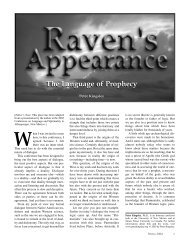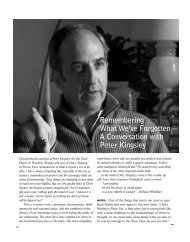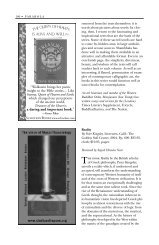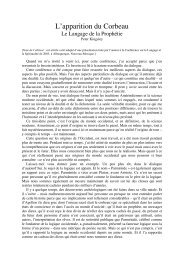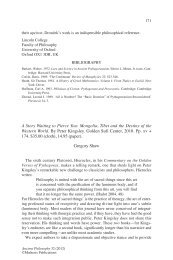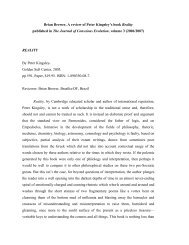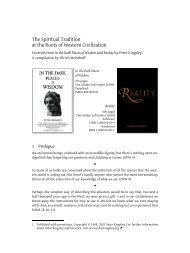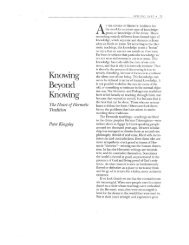Peter Kingsley
Peter Kingsley
Peter Kingsley
Create successful ePaper yourself
Turn your PDF publications into a flip-book with our unique Google optimized e-Paper software.
LEFT: Michael Madzo, The coming of unknown pleasures<br />
(2000). Sewn painted paper, 22 x 12 inches.<br />
and the English translation there—and there was<br />
no correspondence between them. The translators<br />
were not translating Empedocles at all: they<br />
were translating what they vaguely thought and<br />
hoped he might have said. It was a big shock.<br />
With time, when I had returned to Europe, I<br />
eventually understood that something very<br />
strange was going on. I began to realize that in<br />
the last two hundred years each time a scholar<br />
translates Empedocles he might make a point of<br />
questioning some minor detail here or there but<br />
will basically just copy the earlier scholars’ translations.The<br />
result is totally bizarre. I give examples<br />
in my new book, like the one right at the<br />
beginning of the very special passage where<br />
Empedocles is talking about his words and<br />
describing how they need to be absorbed and<br />
taken in. Where he says “If you press my words<br />
down underneath your densely packed<br />
diaphragm” (referring to specific breathing practices),<br />
all scholars nowadays will translate him as<br />
saying “If you press my words into your crowded<br />
brain.” And this process, of crowding our already<br />
crowded brains even further, is of course something<br />
we are all only too familiar with. But it has<br />
nothing to do with what Empedocles is saying.<br />
It’s a very great mystery how people, however<br />
intelligent, will not see what is right in front of<br />
their eyes. There is absolutely no ambiguity in the<br />
Greek: Empedocles is saying “underneath,” not<br />
“into.” But because this is what scholars want<br />
him to say, that is what they will make him mean.<br />
Again, it’s completely self-fulfilling. All that most<br />
people can understand is their own densely<br />
packed brains, so that’s what they assume<br />
Empedocles must have wanted to say through his<br />
own words.<br />
I asked if other scholars were paying as much attention<br />
to the language. Were they missing the meaning because<br />
of not understanding the language?<br />
question completely changed my life. This is another<br />
reason why it’s so important to be careful with<br />
our questions. You need to be very careful when<br />
you ask a question like “Please God, show me . . .”,<br />
because if it’s answered you will pay for that<br />
answer with the rest of your life. We have no idea<br />
how powerful questions are. And this is because<br />
we have no idea how powerful words are .<br />
D r. <strong>Kingsley</strong>’s books offer rich detail to considerable<br />
depth on the language of Parmenides and Empedocles.<br />
It is one of the foundations of his work. I asked for<br />
his comments.<br />
Words are like the ground, the earth. There is a<br />
tremendous power in words, a very particular<br />
power that you ignore at your peril. I should try<br />
to tell, in the briefest outline, the story of how I<br />
came to Empedocles. It was like an accident. I<br />
missed a class in college, which was something<br />
very unusual for me, and because I missed that<br />
one class I was given Empedocles as the subject<br />
for a paper I would have to write over the break.<br />
The other kids teased me about it. I used to travel<br />
a lot in those days, so I took the original Greek<br />
text of Empedocles’ poetry and the most authoritative<br />
English translation I could find and hitchhiked<br />
down to Morocco. Afterwards I realized<br />
that I had done this quite instinctively and unconsciously<br />
because there was no way I could be<br />
introduced to Empedocles while I was a part of<br />
the collectiveness of Europe. There is an incredibly<br />
dense and protective cocoon surrounding<br />
Europe that we are not aware of and that actually<br />
limits our ability to reach beyond it.<br />
So I went down to Tangiers. In my hotel room or<br />
down on the beach I read the Greek text here<br />
It is much deeper than that. Empedocles and<br />
Parmenides were magicians. They knew how to<br />
work with energies we don’t even know exist.<br />
They knew the power of words. They were<br />
responsible for creating, laying the foundation<br />
for, most of this culture we now live in. The mind<br />
can’t understand that, but it is still fascinated by<br />
it and that is why people keep on writing books<br />
about Empedocles and Parmenides. They keep<br />
being drawn. But there is something in their<br />
teachings that the mind can’t understand and<br />
when the mind can’t understand something, and<br />
is fascinated by it, it becomes obsessed.<br />
They will try to rationalize the situation and say<br />
P a rmenides and Empedocles were just the primitive<br />
c h i l d ren of our culture. But they are not the childre n :<br />
we are. And where does this lead? Here is the basic<br />
issue I have come up against many, many times. For<br />
example, back in 1999 I gave a talk at UCLA and presented<br />
the archaeological discoveries that have to<br />
do with Parmenides which show that he was not just<br />
an abstract thinker: that there was much more<br />
Winter/Spring No.1<br />
Black Zinnias



